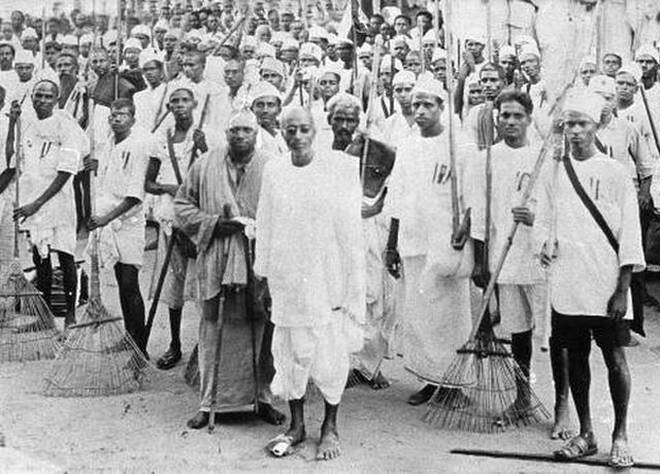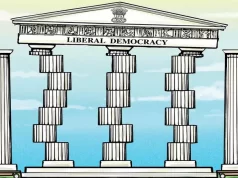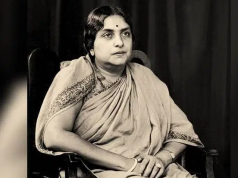Chakravarti Rajagopalachari, born on 10 Dec 1878, to Chakravarti Venkataryan and Chakravarti Singaramma, in the village of Thorapalli in Madras, was the youngest of three brothers. Early on Rajaji displayed two traits that would soon become unique to him, an independent mind and a poor eyesight. At the age of 11 he was admitted to the Central College in Bangalore, and post-matriculation, he pursued higher studies at the Madras University with a specialisation in Criminal Law. In 1900 Rajaji set up a successful practice at Salem, served as a Chairman of the Salem Municipality from 1917–19, and founded the Salem lodge of the Freemasons. Entering the political area in 1916, Rajaji joined the Home Rule League movement. He rallied the cause from his stronghold, explicitly supporting Tilak’s stance of ‘conditional support’ to the War effort- as opposed to Gandhi’s stance of unconditionally backing the Empire.
Despite his opposition, Rajaji was a Gandhian at heart. He was one of the first to believe in the dissenting barrister from South Africa even before his return to India. On his own expense, he re-printed Gandhi’s ‘Jail Experiences’, and would raise and wire funds for his cause across the Indian Ocean. It was at Rajaji’s abode that the Mahatma envisioned his first nationwide Satyagrah against the Rowlatt Act. Undoubtedly, Rajaji was the first to champion the cause, forsaking a lucrative career in the Courts. Only once more did he adorn his coats, that too to defend a Harijan convicted of entering a temple. Rajaji’s charisma, leadership, and his devotion to the principles of Satyagrah earned him the title of ‘Gandhi’s Southern Commander’ as well as his ‘conscience-keeper’. In 1925 he founded an Ashram near Salem, engineered on the lines of the Sabarmati Ashram. His commitment to society’s damned extended beyond social service, instead he devised constructive programs on prohibition and generation of employment to emancipate the oppressed classes. In 1930, Rajaji lead the Salt March at the Tanjore coast-line and courted arrest. Of Rajaji’s allegiance, Gandhiji mused, ‘I have boundless faith in his wisdom, his uprightness, and his unsurpassed ability as a Parliamentarian […] We have in our ranks no abler fighter in Satyagrah.’ But Rajaji’s loyalty was neither blind nor without sense. He was a man of reason, unafraid to air his views.
Under the 1935 Government of India Act, the Empire granted her prized colony limited self-rule. This allowed a selected electorate the right to vote representatives to provincial legislatures- an unfavourable proposition for the mass of political agitators, Rajaji included. Even so, unlike most of his counterparts, Rajaji could see the silver lining, and despite its limited capacities, he viewed the 1935 Act as a real opportunity for social reform. It was his belief that only a ‘moral’ society could create an ethical leadership as it is the ‘…level of character among people generally, which has a continuous effect for good or evil on the character of the members of the administrative staff and the ministers.’ Thus, between partaking in elections and boycotting them, participation was the ‘lesser evil’. To this end, Rajaji contested elections from the Madras Presidency with one press statement that requested his audience to excuse the inexpensiveness of his campaign and to bless him with the opportunity to carry-forth progressive change. Of 5968 votes cast, Rajaji secured a comfortable 5326. Prior to accepting the Premiership of his won province, he negotiated terms with the Viceroy of Madras, obtaining his verbal agreement to not arbitrarily abuse his authority over the newborn legislature. Thus began Rajaji’s second term in public office, from Salem to Madras, only this time the cards he was dealt was a hand like no other. Rajaji found himself leading a bureaucracy of Englishmen to better his home.
The listicle of Rajaji’s greatest achievements as a Statesman is a long one to say the least. But it was in the colonial offices of his Ministries, running the daily show, that Rajaji’s true genius was on display. The Premier chose ability over race, and appointed a European as the Presidency Magistrate. To his Chief Secretary, Charles Brachenbury, he gifted a handsome Khadi suit. In the dead of the night he had the statue of General Neil, a suppressor of the 1857 rebellion, removed from the town centre and shifted it to a museum. He disallowed political affiliation of any government employee to any political party including Congress, much to Nehru’s displeasure. He kept his meetings short, his questions curt, and his spectacled gaze pierced beyond the apparent. Years later, of his conduct as Head, Sardar Patel would recount, ‘It was he who laid the foundations of India’s Parliamentary life in Madras. Those were the days when doubts were expressed about the capacity of our people to carry on the work of administration efficiently, when there were others to watch us…,’ His skilled hand at administration was accompanied with a firm one at reformism. Most notably, Rajaji legalised entry of Harijans into temples, selectively introduced prohibition (opting to make alcohol an expensive affair instead of an illegal one), disallowed the recruitment of anyone but a Harijan for vacancies reserved for them no matter how long the search lasted.
If Rajaji’s Premiership was any indicator, it was that his kind of politics was far more adherent to reality than that of his counterparts, including Gandhi. With a new World War afoot, the sour wounds of broken promises parted once more. The Empire, ignoring the historical irony, once more promised to ‘quit India’ if she allied with them in the War. However, this time the top-brass of Congress had no intention of even endorsing the Empire’s agenda of ‘freedom and liberty’. They demanded independence, and they demanded it at once. Here Rajaji differed.
It was Rajaji’s belief that considering the British predicament, the radicalisation of the Muslim League’s demands, and the possibility of a Japanese invasion, it was in the nation’s best interest to negotiate a deal for self-rule with the Empire- an unpopular and an unwelcome opinion. In 1941 Rajaji came out publicly against Gandhi arguing, ‘We keep our face steadily in the direction of ahimsa but cannot make the mistake of killing the principle itself by opposing it to common sense or reality. The defence of India is a case to be treated as an exception.’ Rajaji was one of the first to forsee the inevitability of Pakistan and devised the innovative ‘C. R. Formula’ to tackle with the question of Pakistan, addressing both- tactics to avoid the split, and measures to control the loss of life and property in case of it. A primary feature of the formula was to conduct plebiscites in muslim-majority districts. The Muslim League rejected it. Rajaji distanced himself from ‘Quit India’, arguing it did not account for India’s volatile reality. This was yet another opinion that was unanimously unwelcome, but Rajaji had always been one to stick to his guns.
And so there were two.
REFERENCES
1. Srinivasan, Vasanthi (2012) Gandhi’s Conscience Keeper: C. Rajagopalachari and Indian Politics; Permanent Black
2. Guha, Ramachandra (2010) Makers of Modern India; Penguin India
3. Shah, Parth, ed. (2001) Profiles in Courage: Dissent on Indian Socialism; Centre for Civil Society
Post Disclaimer
The opinions expressed in this essay are those of the authors. They do not purport to reflect the opinions or views of CCS.






